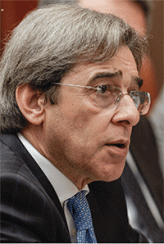To view a PDF of this report click here.
Participating at the Roundtable:
Mauro Borges, Chief Executive Officer. CEMIG
Robson Laranjo, Investor Relations Manager, CEMIG
Evandro Leite Vasconcelos, Chief Trading Offi cer, CEMIG
Marcos Severine, Head of LatAm Utilities and Oil & Gas, JP Morgan
Maria Carolina Carneiro, Equity Research Analyst, Banco Santander
Marcelo Britto Director, Equity Research, Citigroup
Vinicius Canheu,Vice President, Equity Research, Credit Suisse
On September 22, 2015, the chief executive officer, chief trading officer and investor relations manager of Companhia Energética de Minas Gerais (CEMIG), Brazil’s largest integrated electrical power company, met with a group of power sector analysts at the Grand Hyatt São Paulo for a roundtable organized by Institutional Investor. The discussion covered the impact of Brazil’s recession on the energy sector, the company’s plans to shore up its balance sheet while laying the groundwork
Moderator: How is Brazil’s economy affecting the electricity sector?

Robson Laranjo, Investor Relations Manager: Some regions, especially the Middle East and Asia, don’t always have a lot of analysts who focus on Brazil. So their investment decisions can be very conservative. Some might rather stop investing than try to understand the situation. In the United States people follow Brazil a little more closely, and they’re often more worried about the economy than about CEMIG as a company. Many investors are also uneasy about regulatory uncertainty here.
Borges: I think foreign investors are also wary about CEMIG’s new management, especially since a state government chose it, and that state government is from the PT [Workers’ Party], which has become a dirty word in Brazil. There’s nothing we can say that can dispel that mistrust. We have to respond with concrete measures, and we have to show that our controlling shareholder, the state, supports these measures. I think the market is testing us, and that’s legitimate.
We’re responding by improving management. Our audit committee is now much more professional, the quality of the board is higher, and we’ve appointed highly qualified professionals throughout the company.
These are concrete facts, and now these facts have to generate results. It’s going to take some time because this year the scenario is complicated, but by next year we’re going to have solid results that show investors that the company has managed to overcome the economic crisis and is prepared to grow again.
Moderator: What about energy trading? Is that still in crisis or has it gone back to normal?
Evandro Leite Vasconcelos, Chief Trading Officer: Trading is now very active. There’s a lot of uncertainty about future prices, as we’re waiting for the rainy season to see how much rain falls. Since the big industrial players want to avoid uncertainty, they’re looking for long-term contracts. So we’re seeing a lot of demand. The perception that prices in the regulated market will stay high for years is also getting companies to look for contracts now, since prices in the regulated market send signals about prices in the free market. And then there are consumers who might receive government incentives if they move to the free market. It’s a busy time for trading.
Marcos Severine, Head of LatAm Utilities and Oil & Gas, JP Morgan: CEMIG has always distinguished itself by seeking growth, but now your cash flow is different from what it was in past years. What measures are you taking to adapt to this new reality?
Borges: One measure is changing our policy on dividends, which we’re cutting to 25 percent of profits. With the reduced dividend payout, we have more money to build up cash reserves, to make investments and to improve the structure of our debt. Our controlling shareholders, including the government of the state of Minas Gerais and our private strategic partner AG Energia, and our minority shareholders, too, all understand that the company is facing a challenging environment and we have to prepare now for growth in the medium and long terms. Once the electricity sector gets back to normal, we’ll resume our policy of a 50 percent dividend payout.
We’re also changing how we remunerate our employees. We’re making a radical change in our employee profitsharing policies.
Severine: Does the current situation demand a strategic review that focuses more on deleveraging, making adjustments and preparing for a possibly more adverse scenario?
Borges: We’re focused on preparing the group to grow when the time is right. We’re not pursuing an aggressive growth strategy right now. We’re making conservative moves; many of them involve intragroup repositioning of assets. Our participation in auctions and in greenfields reflects that. In transmission there are large auctions where it’s inevitable that we participate. Two large auctions are going to take place in Minas Gerais. The total investment will be high, 8 billion reais [$2 billion]. We’ve established the transmission company TAESA as a vehicle to participate in these auctions.
We have the electricity sector’s greatest engineering capabilities, so we can deliver results, but naturally we have to bring in a partner to avoid excessive leverage in TAESA.
None of this makes for an aggressive growth strategy. It’s a defensive strategy. We are going to grow what is essential, and the main thing is to put our house in order. We’re a state-owned company, but we’re changing the culture, we’re slimming down and tightening up, and we’re facing this question very forcefully. We’re confronting the unions.
Maria Carolina Carneiro, Equity Research Analyst, Banco Santander: How do you see the distribution segment within CEMIG over the next few years? Does it make more sense to increase involvement in generation and transmission, or is the current situation in distribution transitory and there will even be opportunities for you to expand?
Borges: Great question. We think this situation is transitory and that it may be the most promising sector in the future because of distributed generation. The sector’s technological standard is changing, and as Brazil’s largest distributor, our leadership position is unmatched. Since we have a controlling stake in the power distributor Light, we can be an important player in the future process of consolidating distribution in Brazil. Distributed generation is here to stay, and we have a very big stake in it.
Carneiro: As a state-owned company, do you have additional management challenges in distribution in the current environment?
Borges: As a state-owned company, CEMIG’s employee compensation costs are far above average for the sector, so our immediate challenge is to implement a strong policy to reduce expenses, and right now we’re doing just that. The fat is getting cut. This cost-cutting is crucial so that in the future we can benefit from our very strong distribution segment. In the short term we’ve got a lot of work to do, but I’m very aware of this challenge and I’m committed to it.
Marcelo Britto, Director, Equity Research, Citigroup: In my opinion, the shares at current prices are incorporating all the risks, including a worst-case scenario. But we think CEMIG will have to be very disciplined about allocating resources, whether to capex or dividends. It’s a highly leveraged company. So we’re wondering about the financial effort needed for this next auction of concessions [to renew contracts on existing power plants].
Borges: The auction is clearly going to be expensive, but we have advantages that potentially allow us to increase leverage and, through financial engineering and innovative investments, to dilute that possible increase in leverage. First, since it will be, so to speak, a brownfield investment, cash flow will be continuous, so we’d have a very strong receivable for 30 years. We’ll also be very careful about the initial tariff price. Then for us there’s another, crucial variable, the compensation for investments made during our past concessions for these plants. It’s a right guaranteed by law, which ANEEL [Brazil’s electricity regulatory agency] recognizes. That compensation would give us, in terms of guarantees, a lower cost of access to capital.
Britto: Would it also give you a competitive advantage in the auction?
Borges: That would be ideal, but I don’t believe it will happen in time for this next auction [on November 6]. ANEEL is going to define the compensation’s value in December. But just taking the three old CEMIG plants, we estimate a billion reais of compensation, costs of 2 billion to renew the concessions, so a net cost of 1 billion. Even if we don’t get the compensation before the auction, it gives us a significant receivable that can help us finance our participation and mitigate leverage.
Another possibility is an association with other companies to participate in auctions. For that we have two big advantages. First, we know the power plants, even the ones that don’t belong to CEMIG. The Chinese don’t have our level of knowledge. The second is that we’re a major energy trader. With 30 percent of the free market, CEMIG is a very desirable partner.
Carneiro: The upcoming auctions will be based not just on price but on other variables, too. How do you view that?
Borges: The auctions have the great merit of a mobile formula, a percentage for the free market and for the regulated market. For this next auction, it’s going to be 30-70. For other auctions we’ve been working with an average of around 50-50. I think that when rainfall goes back to normal, those percentages may change and we’ll have a system for offering concessions in generation that is much more interesting and competitive, and which will bring the best players into the bidding process. I think that the new design of the auction is much better than the old one, the federal government’s approach is improving, and that’s very positive.
Vasconcelos: Price is tangible cost plus risk, and risk is now more important. We’ve all cut costs. The margin for a competitive advantage there isn’t big, but in risk management it’s huge because we’re still in the early stages of pricing risk in the Brazilian electricity sector. There’s implementation risk, which is mainly about the environment. Everyone used to just add 10 percent to the budget, but now we do much more precise analysis. We work to manage and mitigate this implementation risk. Then there’s market risk. There’s a lot of price volatility in Brazil, and to create a multiyear plan, you need to know prices. In 2008 we used to sell energy at 140 reais in the free market. In 2012 we sold that same energy at 90, and today we’re selling it for 200 or more. Foreign exchange risk affects financing, especially since the BNDES [national development bank] doesn’t have the firepower that it used to.
Vinicius Canheu, Vice President, Equity Research, Credit Suisse: I’d like to know more about CEMIG’s decision to keep shares in Renova, in the yield company. Is having assets outside of Brazil part of CEMIG’s strategy?
Borges: It is. Our association with SunEdison in Renova is strategic. SunEdison has extremely advanced solar technology, and we have a large distributor.
Vasconcelos: Solar today is a big thing, distributed generation is the next big thing, so CEMIG is positioning itself. And Renova fits into our strategy for raising capital. The yield structure is a way of accessing capital in the U.S. at prices that are much, much lower. Also, unlike in Brazil, the capital markets in the U.S. are open year round.
Moderator: Can you quantify how much lower the cost of capital is in the U.S., or are the conditions still too volatile?
Vasconcelos: We’re just starting to access that market, and it’s a difficult time because of the turbulence there. But the deal is set up with the prospect that it will go on until 2020–2021, with access to capital there. It’s set at a prefixed yield, so for Renova the risk is small. TerraForm itself is in very good financial shape — they raised funds in anticipation of all commitments for the next two years — so in spite of the market turbulence, we’re very solid.
Severine: Can you comment more on Renova given that the shares it received have lost half their value since the IPO?
Vasconcelos: With Renova, 36 percent of the deal is exposed to share price risk; the rest we’ll receive either in cash or in stock guaranteed at the price of the IPO. And the long-term strategy is the partnership with SunEdison. We’re paying a price for that partnership, but SunEdison is, too. They paid a premium over market price for Light’s stake in Renova.
We thought a lot about this deal. Was it time for Renova to stop growing? With our backlog we have work until 2020 or 2021. But unlike the traditional hydroelectric or thermoelectric market, which is always going to be here, the renewables are marginal. Wind power will never be a significant part of the Brazilian market. Right now there’s a window of opportunity, but it’s going to close sooner or later. So our decision was to move cautiously, conservatively, but not to miss this window. And the best way to access this market and mitigate capital risk was this deal with Renova, almost all of which has a guaranteed cash flow.
Borges: Once the yield company is operational, the two sides are going to analyze the assets in the backlog. It’s not automatic that they’re all going to the yield company; we’ll have to make sure it’s the best place for them. We could keep part of Renova as an asset holder.
Vasconcelos: We’ve made a good deal, but we have the option of making Renova what it was before.
Borges: It could become an asset company again.
Vasconcelos: It’s a modern relationship. We’re going to live together for a while, and if it works out, then we’ll get married.
Severine: From 2004 to 2015 the company had a very strong investment cycle. Is the company’s capital allocation strategy now to focus on reducing its leverage and increasing profitability, so perhaps new investments will stop for now?
Borges: Yes, reducing leverage and increasing profitability is the strategy right now. We still have some room to grow, defensively, through maintaining positions in private vehicles. Our task, in the holding company and our subsidiaries, is to become leaner and less leveraged. I think that rainfall may soon help us a great deal. In any case, we have to make ourselves into a leaner company that has the capacity to generate more cash flow. Our strategy is very conservative. It’s about taking advantage of opportunities that have already been prepared.
Vasconcelos: We’ve got a better natural selection of investments.
Borges: And these investments are all already at an advanced stage—recent auctions, for example. They’ve all been in areas that the company already dominates. Other than that, the priority is to reduce the company’s leverage. I don’t want a company with a high level of financial stress, so right now we’re going through a transition. If I need three years for this transition, then I’ll take three years, there’s no question about it. Our mission is to shore up the company and keep its remarkable qualities; our engineering is fabulous. This is a conservative stance. It’s defensive growth, not aggressive growth, that’s the company’s policy today.





